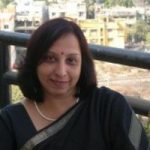
“Nobody can advise you and help you. There’s only one way to proceed. Go inside yourself. Explore the reason that compels you to write; test whether it stretches its roots into the deepest part of your heart…”
Menka Shivdasani
In the haste and the mindset that a digital world implies, there are times when a writer must slow down.
Many years ago, when I was struggling to make sense of the world, and my responses to it as a writer, the poet Nissim Ezekiel introduced me to a classic — Letters to a Young Poet by Rainer Maria Rilke.
Like much else these days, this book is now available free of cost online; it consists of 10 letters that Rilke wrote to an aspiring poet from 1902 through 1908. “Nobody can advise you and help you, nobody,” Rilke wrote. “There’s only one way to proceed. Go inside yourself. Explore the reason that compels you to write; test whether it stretches its roots into the deepest part of your heart…”
While many of Rilke’s truths are still as relevant today as they were when he wrote them, the world as we know it is a very different place. The Internet determines almost every thought and action, and certainly it is a space where poets can get together; a quick search of the phrase ‘online poetry groups’ throws up 58,400,000 results in 0.37 seconds. The global movement, 100 Thousand Poets for Change, which began three years ago as an idea that spread over the Internet, resulted in 700 on-ground poetry events on a single day across the world in the first year. The computer is now every young writer’s soapbox, a platform to spout verse to anyone willing to listen.
There is no doubt that there are many benefits to be had from this online revolution, but in this digital world – in the haste and the mindset it implies – there are times when a writer must slow down, step back into silence. Wendell Berry, the American author, has a wonderful poem about this, titled How to be a Poet (to Remind Myself), in which he tells himself to “make a poem that does not disturb / the silence from which it came”.
As a journalist, I have always recognized the importance of speed, but as a poet, I know there is value in what Berry says. While the thrill of seeing a book published is unmatched, a collection of poetry, whether digital or in print, should not be put together in a hurry, and then reduced simply to being a calling card, or an ego boost; it must be a distillation of a lifetime’s worth of thought, feeling and experience. Dom Moraes, winner of the Hawthornden Prize at the age of 19, went into a 17-year poetic hibernation at a later stage in his life; when he emerged, he discovered a new and stronger voice.
Young writers must always find their own truths, but here are a few of my personal maxims, evolved over the decades. I took my time accepting some of them, but there is no doubt they have proved enormously useful to me, in my struggle to keep writing through the chaos and cacophony of the world.
To become a poet…
– If you want to write good poetry, first read good poetry.
– Pay attention to craft and to what may seem like little details.
– Be willing to revise, as many times as necessary.
– Let your work mature before you allow it to be published.
– Learn to value silence, so that you can hear the sound of your inner voice. Then stay faithful to it, and true to yourself.
__________________
 Menka Shivdasani, a Mumbai-based writer, has four collections of poetry. She is co-translator of Freedom and Fissures, an anthology of Sindhi Partition Poetry. She has edited a SPARROW anthology of women’s writing, and two anthologies of contemporary Indian English poetry for the American e-zine, www.bigbridge.org. Menka is the recipient of the Ethos Literary Award and a Rabindranath Tagore Literary Prize Certificate for ‘excellent contribution to literature’.
Menka Shivdasani, a Mumbai-based writer, has four collections of poetry. She is co-translator of Freedom and Fissures, an anthology of Sindhi Partition Poetry. She has edited a SPARROW anthology of women’s writing, and two anthologies of contemporary Indian English poetry for the American e-zine, www.bigbridge.org. Menka is the recipient of the Ethos Literary Award and a Rabindranath Tagore Literary Prize Certificate for ‘excellent contribution to literature’.
Courtesy: The Hindu